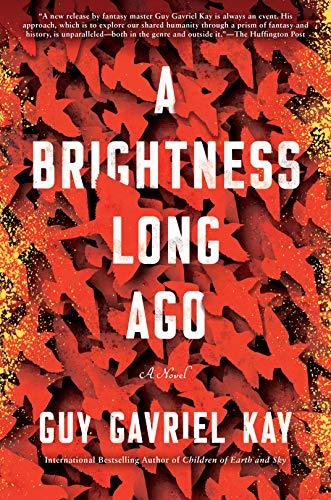cpark2005 reviewed A Brightness Long Ago by Guy Gavriel Kay
Review of 'A Brightness Long Ago' on 'Goodreads'
5 stars
Guy Gavriel Kay’s A Brightness Long Ago is a beautiful story. It is vintage Kay, with prose that can only be properly described as art. It’s the sort of story that elicits emotion at nearly every turn. Sometimes aching and haunting, sometimes tragic and nostalgic. It’s a deeply personal tale about the small people who still contribute to great events, and perhaps in doing so have a measure of greatness themselves.
One of my first thoughts on finishing A Brightness Long Ago was that I would never be able to write an adequate review for this novel. To even attempt a review felt a bit like hubris. After all, any words I might put down to describe and quantify this story would only pale in comparison to the work itself. I could describe characters, plot, and setting. Each of these are excellent, beautifully crafted, world class in execution. But what stands out most about this novel is the feeling it left me with, the satisfaction of reading it. I often reread paragraphs for the beauty of the prose or to simply read again the profound thought or reflection being offered. Paragraphs like this one, which begins the novel:
“The sailors say the rain misses the cloud even as it falls through light or dark into the sea. I miss her like that as I fall through my life, through time, the chaos of our time. I dream of her some nights, still, but there is nothing to give weight or value to that, it is only me, and what I want to be true. It is only longing.”
Each of the characters are vividly and lovingly crafted, multifaceted and complex. They feel real. And in some ways almost more than real. They are complex enough to allow us to glimpse, if only for a moment, those we have known who might share similarities with them. This causes them to be much more than characters on a page. They become people, real and breathing, or at least so it seems. It is exceedingly rare to find characters that feel so unique, so authentic. The characterizations stand out as exceptional even in comparison to those in Kay's other novels. As with all of his work, this one makes us feel deeply. For the characters we come to love and what they go through...but also for ourselves. The narrative style surfaces our own memories, mixing our quite real nostalgia and memory with that portrayed in the telling of the story itself. Where does one begin and the other end? How much of our memory is truth, and how much simply a hope of how we ought to have acted or wish we had felt? These sorts of questions blend seamlessly with a plot that is perfectly paced and set in a fully realized world. Much of Kay’s fiction, while technically secondary world, takes place in a world quite similar to Europe in various parts of its history. This story centers on Batiara, roughly analog to Renaissance Italy in our own world. Perhaps most importantly, Kay’s world is fully realized and the way he tells the story leaves no doubt in your mind that you are getting only a glimpse, fleeting and yet beautiful, of the lives taking place in this world that is so like and yet unlike our own.
This book, even more than Kay's other works, reads as a reflection on the vagaries of life. How we each manage, lives changing on a moment, a single decision, as we each make our way "under the god's sun." It's also a book about how our lives affect and change the lives of others, even when--especially when?--we don't intend it. Perhaps most of all it makes us think about the idea of memory, the way we may vividly recall those seemingly random happenings that shaped our lives many years later and turn them over in our minds, finding new meaning in them, or not.
I am not old. But in reading this novel I find myself reflecting on my own youth, my own formation. There is a sense in which our adolescence shapes us, for good and ill. We find those memories, I find those memories, especially vivid, moving, bright. Kay crafts a story here that is more than a story. It's a sort of memoir. A reflection on memory and especially on this tendency we have to remember vividly--if not always fondly--those days of our own liminality, or own becoming. Those events which most shaped us as the people we were to become. In the words of the novel, "perhaps it is true of every life, that times from our youth remain with us, even when the people are gone, even if many, many events have played out between where we are and what we are remembering."
This is Kay at his finest, his most reflective, his most powerful.
10/10
5/5 stars
This review originally appeared on Fantasy Book Review

